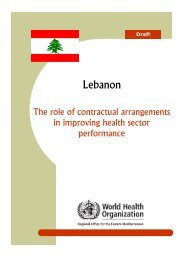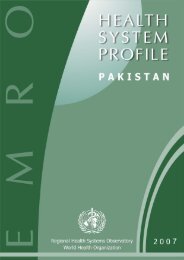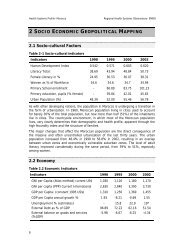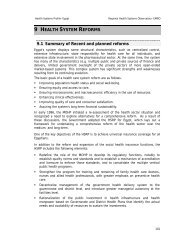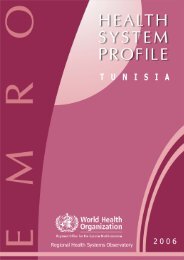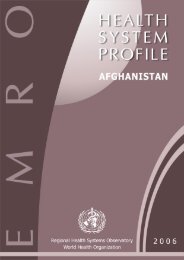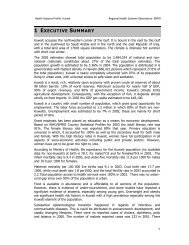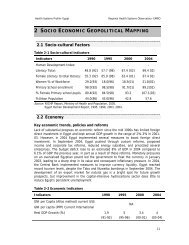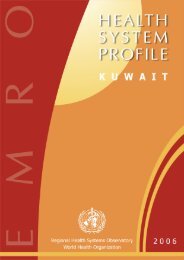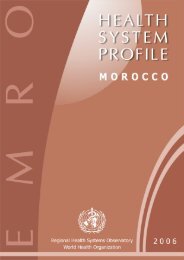The role of contractual arrangements in improving health sector ...
The role of contractual arrangements in improving health sector ...
The role of contractual arrangements in improving health sector ...
Create successful ePaper yourself
Turn your PDF publications into a flip-book with our unique Google optimized e-Paper software.
Jordan<br />
attract foreign <strong>in</strong>vestment, technology and know-how. Strengthen<strong>in</strong>g public–private<br />
partnership is one <strong>of</strong> the major policy directions <strong>of</strong> his majesty K<strong>in</strong>g Abdullah to<br />
successive governments.<br />
Privatization and partnership policies <strong>in</strong> Jordan are not <strong>in</strong>tended to replace the<br />
traditional <strong>role</strong> <strong>of</strong> the M<strong>in</strong>istry <strong>of</strong> Health <strong>in</strong> the provision <strong>of</strong> <strong>health</strong> services. Rather,<br />
they aim to complement this <strong>role</strong> by open<strong>in</strong>g wide doors <strong>in</strong>to the private <strong>sector</strong> to<br />
utilize its <strong>health</strong> resources <strong>in</strong> an effective and efficient way that reflects positively on<br />
both parties and on the overall economy <strong>of</strong> the country.<br />
Contract<strong>in</strong>g out services with the private <strong>sector</strong> is used by the government, to<br />
extend highly subsidized and free the M<strong>in</strong>istry <strong>of</strong> Health services to the poor and the<br />
vulnerable. <strong>The</strong> <strong>in</strong>creas<strong>in</strong>g number <strong>of</strong> contracts between the M<strong>in</strong>istry <strong>of</strong> Health over<br />
the past three years (e.g. K<strong>in</strong>g Abdullah Hospital, Al-Husse<strong>in</strong> Cancer Centre, Lozmila<br />
Hospital, Al-Mowasah Hospital, Al-Hayah Hospital) is evidence <strong>of</strong> the high political<br />
commitment towards the execution <strong>of</strong> <strong>contractual</strong> agreements.<br />
<strong>The</strong> exist<strong>in</strong>g legal mandates and regulations give authority to the M<strong>in</strong>istry <strong>of</strong><br />
Health to contract with private and autonomous public <strong>health</strong> providers. This legal<br />
authority is stated explicitly <strong>in</strong> Article 26 <strong>of</strong> the Civil Health Insurance law number<br />
10, issued <strong>in</strong> 1983. This article reads: “<strong>The</strong> M<strong>in</strong>ister <strong>of</strong> Health has the authority to<br />
contract out <strong>health</strong> services with private and autonomous public <strong>sector</strong>s (hospitals,<br />
doctors, laboratories, etc.) to provide <strong>health</strong> services for CHIP enrollees.”<br />
Article 4 <strong>of</strong> the high Health Council Law states that the Council should develop<br />
policies to strengthen the partnership between public and private <strong>health</strong> <strong>sector</strong>s and<br />
ensure that the two <strong>sector</strong>s complete and support each other. Policy number 6 <strong>in</strong> the<br />
Strategic Health Plan for 2004–2006 reflects high commitment <strong>of</strong> the government<br />
towards build<strong>in</strong>g robust relationships among the different <strong>health</strong> <strong>sector</strong>s to provide<br />
high quality, effective and efficient <strong>health</strong> services. <strong>The</strong> plan <strong>in</strong>cludes for the first time<br />
some projects related to the private <strong>sector</strong>.<br />
Jordan also has an advanced and <strong>in</strong>dependent judicial system. <strong>The</strong> Jordanian<br />
Constitution guarantees the <strong>in</strong>dependence <strong>of</strong> the judicatory authority. Thus, there are<br />
efficient and transparent mechanisms to recourse <strong>in</strong> the event <strong>of</strong> a dispute between the<br />
M<strong>in</strong>istry <strong>of</strong> Health and any contract<strong>in</strong>g partner.<br />
M<strong>in</strong>istry <strong>of</strong> Health capabilities, strengths and weaknesses regard<strong>in</strong>g contract<strong>in</strong>g<br />
Due to its accumulated experience <strong>in</strong> contract<strong>in</strong>g, the M<strong>in</strong>istry <strong>of</strong> Health has<br />
developed essential adm<strong>in</strong>istrative and f<strong>in</strong>ancial skills <strong>in</strong> contract management over<br />
time, especially with<strong>in</strong> the Health Insurance Directorate (HID). <strong>The</strong> majority <strong>of</strong> the<br />
exist<strong>in</strong>g <strong>contractual</strong> <strong>arrangements</strong> are merely agreement protocols that lack<br />
competitive bidd<strong>in</strong>g procedures, performance evaluation or <strong>in</strong>tegrated computerized<br />
<strong>in</strong>formation systems. <strong>The</strong>refore, most <strong>of</strong> the experience accumulated <strong>in</strong> the HID is<br />
limited to review<strong>in</strong>g providers’ claims, process<strong>in</strong>g reimbursement transactions and<br />
119




